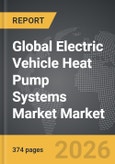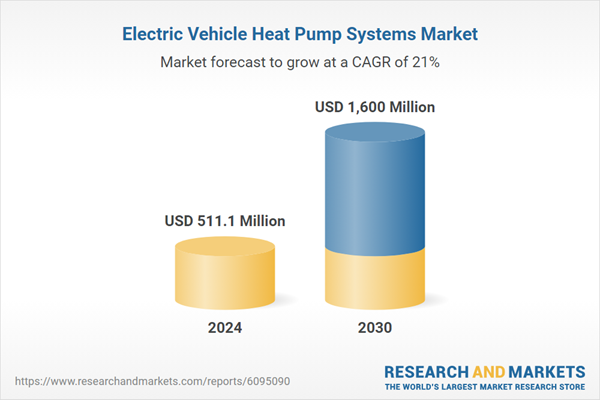Global Electric Vehicle Heat Pump Systems Market - Key Trends & Drivers Summarized
Why Are Heat Pump Systems Gaining Attention in EV Climate Control?
In electric vehicles, managing cabin comfort without significantly impacting battery range is a critical challenge - one that heat pump systems are well-positioned to address. Unlike traditional resistance heaters, which consume large amounts of battery power, heat pumps move ambient heat using refrigerant cycles, offering far greater efficiency. This makes them a vital component in EV thermal architecture, especially in cold climates where battery performance drops and heating demands rise.The heat pump system typically includes a compressor, evaporator, condenser, expansion valve, and electronic control unit. Advanced systems can integrate with battery thermal management and HVAC to provide shared heating or cooling functions, maximizing system synergy. As automakers strive to increase real-world range, heat pumps are being adopted across mid- to high-end EVs from brands like Tesla, Hyundai, and Volkswagen.
What Innovations Are Enhancing Performance and Compactness?
Recent advancements in refrigerant selection, variable-speed compressors, and intelligent control algorithms are significantly improving heat pump efficiency. CO2-based (R744) heat pumps are gaining favor for their low environmental impact and excellent low-temperature performance. These systems perform better in sub-zero conditions and offer faster cabin warm-up with reduced battery draw.Integrating the heat pump with the vehicle's high-voltage battery cooling loop allows for smart thermal switching, balancing the needs of the battery and passenger cabin. Some automakers are developing bi-directional heat pumps that can both heat and cool the cabin or battery, depending on climate demands. Software-based control optimizations further enhance performance by dynamically adjusting pressure levels, cycle timings, and airflow distribution in real-time.
Modularity is another key trend. OEMs seek compact heat pump modules that can be standardized across multiple EV platforms. Suppliers are responding with flexible architecture solutions that include all critical components within a single unit, simplifying integration and reducing assembly cost. Enhanced diagnostics and remote firmware updates are also being incorporated for predictive maintenance.
Which Markets and Segments Are Accelerating Adoption?
Europe is the fastest-growing market for EV heat pumps, driven by cold winters, strict range requirements, and regulatory emphasis on energy efficiency. Northern European countries such as Norway, Sweden, and Germany have the highest installation rates of heat pump systems in EVs. In North America, interest is growing, particularly in Canada and northern U.S. states.Asian markets are also expanding. China's large EV volume is translating into economies of scale for heat pump components. Automakers like NIO and BYD are investing in proprietary thermal management modules that include heat pump functionality for both cabin and battery systems. Japan and South Korea, given their legacy in HVAC and automotive components, are leading innovation in compressors and eco-friendly refrigerants.
Heat pumps are also becoming standard in premium and long-range EVs where performance per watt is a key selling point. Fleet operators and logistics providers in cold regions are seeking vehicles with heat pump systems to ensure consistent operation and range in winter. As such, the technology is expanding into commercial vans and buses.
What Is Driving Growth in EV Heat Pump Systems Globally?
The growth in the electric vehicle heat pump systems market is driven by several factors including rising demand for energy-efficient thermal systems, harsh climate adaptation needs, government subsidies for long-range EVs, and tighter regulations on vehicle efficiency. Heat pumps significantly reduce the energy load on EV batteries, translating to longer range and lower operating costs - critical concerns for both private and fleet buyers.Regulatory bodies are rewarding OEMs that achieve higher WLTP or EPA range ratings, and heat pump-equipped EVs often qualify for these incentives. This makes heat pumps not just an engineering choice, but a strategic tool for market positioning. The environmental benefits of replacing resistive heating with heat exchange-based systems also align with sustainability mandates.
Automakers and Tier-1 suppliers are investing in joint ventures and R&D to reduce the cost of heat pump systems, making them viable even for mid-range EV models. Integration with vehicle energy management systems, OTA firmware control, and embedded diagnostics also allow heat pumps to become intelligent components in the broader EV control ecosystem.
Report Scope
The report analyzes the Electric Vehicle Heat Pump Systems market, presented in terms of market value (US$). The analysis covers the key segments and geographic regions outlined below:- Segments: Propulsion (BEV Heat Pump Systems, HEV Heat Pump Systems, PHEV Heat Pump Systems); Component (Evaporator, Condenser, Compressors); Vehicle Type (Passenger Cars Heat Pump Systems, Commercial Vehicles Heat Pump Systems).
- Geographic Regions/Countries: World; United States; Canada; Japan; China; Europe (France; Germany; Italy; United Kingdom; Spain; Russia; and Rest of Europe); Asia-Pacific (Australia; India; South Korea; and Rest of Asia-Pacific); Latin America (Argentina; Brazil; Mexico; and Rest of Latin America); Middle East (Iran; Israel; Saudi Arabia; United Arab Emirates; and Rest of Middle East); and Africa.
Key Insights:
- Market Growth: Understand the significant growth trajectory of the BEV Heat Pump Systems segment, which is expected to reach US$956.7 Million by 2030 with a CAGR of a 22.5%. The HEV Heat Pump Systems segment is also set to grow at 19.5% CAGR over the analysis period.
- Regional Analysis: Gain insights into the U.S. market, valued at $139.2 Million in 2024, and China, forecasted to grow at an impressive 27.7% CAGR to reach $371.6 Million by 2030. Discover growth trends in other key regions, including Japan, Canada, Germany, and the Asia-Pacific.
Why You Should Buy This Report:
- Detailed Market Analysis: Access a thorough analysis of the Global Electric Vehicle Heat Pump Systems Market, covering all major geographic regions and market segments.
- Competitive Insights: Get an overview of the competitive landscape, including the market presence of major players across different geographies.
- Future Trends and Drivers: Understand the key trends and drivers shaping the future of the Global Electric Vehicle Heat Pump Systems Market.
- Actionable Insights: Benefit from actionable insights that can help you identify new revenue opportunities and make strategic business decisions.
Key Questions Answered:
- How is the Global Electric Vehicle Heat Pump Systems Market expected to evolve by 2030?
- What are the main drivers and restraints affecting the market?
- Which market segments will grow the most over the forecast period?
- How will market shares for different regions and segments change by 2030?
- Who are the leading players in the market, and what are their prospects?
Report Features:
- Comprehensive Market Data: Independent analysis of annual sales and market forecasts in US$ Million from 2024 to 2030.
- In-Depth Regional Analysis: Detailed insights into key markets, including the U.S., China, Japan, Canada, Europe, Asia-Pacific, Latin America, Middle East, and Africa.
- Company Profiles: Coverage of players such as Aisin Corporation, Allison Transmission Holdings Inc., AVL List GmbH, BorgWarner Inc., Continental AG and more.
- Complimentary Updates: Receive free report updates for one year to keep you informed of the latest market developments.
Some of the 44 companies featured in this Electric Vehicle Heat Pump Systems market report include:
- Denso Corporation
- Eberspächer Group
- Estra Automotive Systems
- Hanon Systems
- Hitachi Astemo Ltd.
- Hyundai Motor Company
- LG Electronics Inc.
- MAHLE GmbH
- MAN Energy Solutions
- Marelli Holdings Co., Ltd.
- Mitsubishi Heavy Industries, Ltd.
- Modine Manufacturing Company
- Nissan Motor Co., Ltd.
- Panasonic Corporation
- rose Fahrzeugteile SE & Co. KG
- Sanden Corporation
- Stiebel Eltron GmbH & Co. KG
- Tesla, Inc.
- Toyota Industries Corporation
- Valeo SA
This edition integrates the latest global trade and economic shifts into comprehensive market analysis. Key updates include:
- Tariff and Trade Impact: Insights into global tariff negotiations across 180+ countries, with analysis of supply chain turbulence, sourcing disruptions, and geographic realignment. Special focus on 2025 as a pivotal year for trade tensions, including updated perspectives on the Trump-era tariffs.
- Adjusted Forecasts and Analytics: Revised global and regional market forecasts through 2030, incorporating tariff effects, economic uncertainty, and structural changes in globalization. Includes historical analysis from 2015 to 2023.
- Strategic Market Dynamics: Evaluation of revised market prospects, regional outlooks, and key economic indicators such as population and urbanization trends.
- Innovation & Technology Trends: Latest developments in product and process innovation, emerging technologies, and key industry drivers shaping the competitive landscape.
- Competitive Intelligence: Updated global market share estimates for 2025, competitive positioning of major players (Strong/Active/Niche/Trivial), and refined focus on leading global brands and core players.
- Expert Insight & Commentary: Strategic analysis from economists, trade experts, and domain specialists to contextualize market shifts and identify emerging opportunities.
Table of Contents
Companies Mentioned (Partial List)
A selection of companies mentioned in this report includes, but is not limited to:
- Denso Corporation
- Eberspächer Group
- Estra Automotive Systems
- Hanon Systems
- Hitachi Astemo Ltd.
- Hyundai Motor Company
- LG Electronics Inc.
- MAHLE GmbH
- MAN Energy Solutions
- Marelli Holdings Co., Ltd.
- Mitsubishi Heavy Industries, Ltd.
- Modine Manufacturing Company
- Nissan Motor Co., Ltd.
- Panasonic Corporation
- rose Fahrzeugteile SE & Co. KG
- Sanden Corporation
- Stiebel Eltron GmbH & Co. KG
- Tesla, Inc.
- Toyota Industries Corporation
- Valeo SA
Table Information
| Report Attribute | Details |
|---|---|
| No. of Pages | 374 |
| Published | February 2026 |
| Forecast Period | 2024 - 2030 |
| Estimated Market Value ( USD | $ 511.1 Million |
| Forecasted Market Value ( USD | $ 1600 Million |
| Compound Annual Growth Rate | 21.0% |
| Regions Covered | Global |









